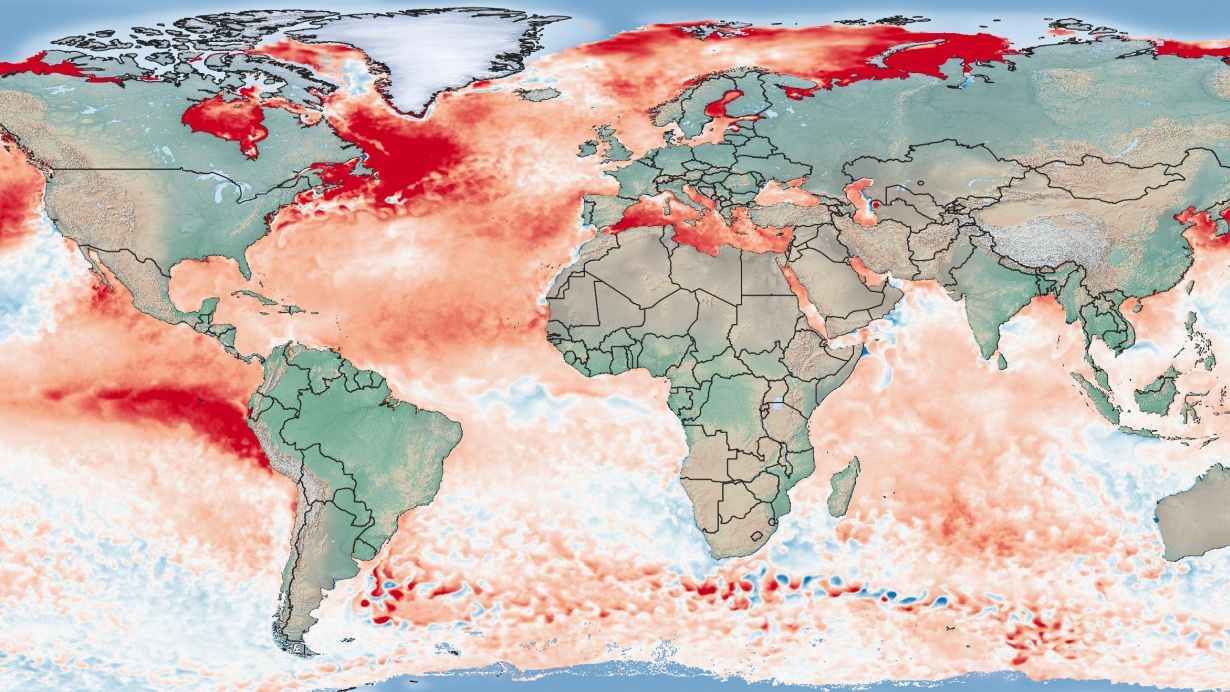The first three weeks of July 2023 have been the hottest global three-week period so far. In the summer months of 2023, twice as many people in Germany were exposed to daily temperatures of 35 degrees and higher than the average from 1980 to 1999. This is obvious from a study published recently by Karlsruhe Institute of Technology (KIT). Researchers from KIT’s Center for Disaster Management and Risk Reduction Technology (CEDIM) report that the European population’s exposure to heat was highest in Italy. (DOI: 10.5445/IR/1000161235)
In the summer of the year 2023, several hot spells of variable length and intensity occurred partly simultaneously in different regions of the northern hemisphere. In their “Untersuchung der globalen Hitzewelle im Jahr 2023” (investigation of the global heat wave in 2023), researchers of the Forensic Disaster Analysis (FDA) Task Force Group of KIT’s CEDIM analyzed the record temperatures reached and the population’s exposure to heat.
Ocean Surface Temperatures in June 2023 Were as High as Never Before since records began
In some regions, previous all-time record temperatures were exceeded by far, in other areas new daily or monthly records were recorded. In June 2023, global mean ocean surface temperatures were as high as never before. As regards the Earth’s surface, including landmass, June 2023 has been the warmest June since 1850. On a global scale, the first three weeks of July 2023 were the hottest three-week period ever. The daily record, a global surface temperature of 17.08 degrees Celsius was reached on July 6, closely followed by July 5 and 7 with 17.07 degrees Celsius each. In July 2023, extreme temperatures and new country records – official confirmation by the World Meteorological Organization (WMO) is still pending –were reached in the Mediterranean countries, including North Africa and the Middle East. Record-breaking temperatures were also reported by the USA, Canada, and China.
“For a big temperature anomaly to develop over a longer term, a long-lasting and unusually large-scale flow pattern is required,” says Dr. Andreas Schäfer from the FDA Task Force Group of CEDIM. Pressure distribution in the middle troposphere at about 5.5 kilometers altitude plays an important role, as it influences upper airflow and the associated air mass transport. “In July 2023, extraordinarily persistent high-pressure areas prevailed in the regions affected by the high temperatures. Here, descending air masses contributed significantly to warming and the local development of the heat wave,” Schäfer says.
The researchers also studied the population’s exposure to heat. In Germany, about seven million people were exposed to daily maximum temperatures higher than 25 degrees Celsius. These were about 40 percent more than the average number of the years 1980 to 1999. The number of persons exposed to daily temperatures of 35 degrees Celsius and higher even doubled to about 206,000. Compared to previous decades, heat exposure during the summer months was also much higher in Italy, Greece, Spain, the USA, China, and India.
Italy Reached Heat Records of More than 40 Degrees Celsius
In Europe, Italy suffered from the biggest heat by far. Here, new record heats of more than 40 degrees Celsius were measured. While only 4000 people per day had been exposed to such high temperatures from 1980 to 1999, this number increased to more than 127,000 in 2023. To counteract the negative impacts of heat exposure on human health, state institutions adopted action plans and implemented various adaptation strategies, including the installation of public wells and water dispenser systems. In Germany, such systems can mostly be found in conurbations. (or)
Center for Disaster Management and Risk Reduction Technology (CEDIM)
CEDIM is an interdisciplinary institution of KIT that performs research on disasters, risks, and security. The aims of its research are a better understanding, earlier detection, and better management of natural and anthropogenic risks in a rapidly changing world with increasing population, rapid urbanization, and climate change. CEDIM researchers combine risk identification, analysis, management, and communication to develop strategies for improving the resilience of infrastructure and supply networks.
Original Publication (Open Access)
Andreas Schäfer, Bernhard Mühr, Florian Kaiser, Denise Böhnke, Susanna Mohr, Michael Kunz: Untersuchung der globalen Hitzewelle im Jahr 2023. Report No.1. CEDIM Forensic Disaster Analysis (FDA) Group, Karlsruhe Institute of Technology (KIT), 2023. DOI: 10.5445/IR/1000161235
https://publikationen.bibliothek.kit.edu/1000161235
More Information on CEDIM
More about the KIT Climate and Environment Center
Being “The Research University in the Helmholtz Association”, KIT creates and imparts knowledge for the society and the environment. It is the objective to make significant contributions to the global challenges in the fields of energy, mobility, and information. For this, about 10,000 employees cooperate in a broad range of disciplines in natural sciences, engineering sciences, economics, and the humanities and social sciences. KIT prepares its 22,800 students for responsible tasks in society, industry, and science by offering research-based study programs. Innovation efforts at KIT build a bridge between important scientific findings and their application for the benefit of society, economic prosperity, and the preservation of our natural basis of life. KIT is one of the German universities of excellence.

